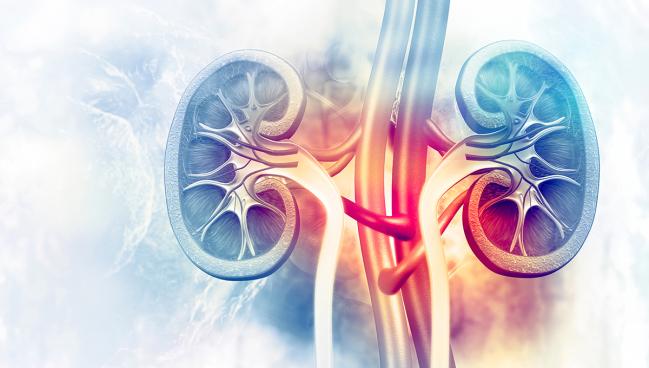Kidney Events High in Older Patients After HF Hospitalization
More than half were discharged from a HF hospitalization with kidney disease and one in 20 progressed to dialysis within a year.

Kidney disease needs prioritization in older patients hospitalized for heart failure (HF) due to elevated risk of kidney complications, readmission, and death, an analysis of the Get With The Guidelines – Heart Failure (GWTGHF) registry suggests.
Among more than 80,000 Medicare beneficiaries, 63% were discharged with an estimated glomerular filtration rate (eGFR) less than 60 mL/min/1.73m2, indicative of kidney disease, and 6% progressed to needing dialysis within 1 year.
“Until now, the epidemiology of cardiovascular conditions, kidney conditions, and metabolic conditions have really been understood in relative silos,” senior study author Muthiah Vaduganathan, MD, MPH (Brigham and Women’s Hospital and Harvard Medical School, Boston, MA), told TCTMD. “As heart failure clinicians, we often underestimate the true burden of kidney disease in patients we commonly treat, including in the hospitalized setting.”
He said the study is eye-opening because “we wouldn’t necessarily anticipate that in an older segment of the heart failure population that dialysis burden is this high.”
Another surprising finding was that 7% of hospitalized HF patients were readmitted for acute kidney injury (AKI) within a year.
“In a contemporary heart failure population, we cannot ignore the burden of kidney disease faced by our patients,” Vaduganathan added. “Our treatment regimens and our approaches to clinical care similarly should be comprehensive, not only addressing and attempting to slow down the progression of heart failure, but also simultaneously helping to protect kidney health and to prevent kidney disease complications like requiring dialysis or developing acute kidney injury.”
Commenting for TCTMD, Mitchell Psotka, MD, PhD (Inova Heart and Vascular Institute, Falls Church, VA), said the complex interplay between the heart and the kidneys in patients with HF, and the recognition that newer medications may act on both organs, is driving the search to understand how to improve renal outcomes.
He said he wasn’t surprised by the magnitude of kidney disease in the older HF patient population in this study.
“We see this not infrequently, that in patients who have borderline kidney function, we often need to really engage with a whole other community, the nephrology community, to help manage them,” he said. “In fact, we've had discussions at our institution of having dual clinics with cardiology and nephrology together because there are so many of these patients that we are managing today.”
He added that co-existing kidney disease is likely to become even more prevalent among HF patients as more and more of them live longer with multiple comorbidities.
Low eGFR at Discharge Portends Poor Outcomes
Published online May 29, 2024, in JAMA Cardiology, the analysis led by John W. Ostrominski, MD (Brigham and Women’s Hospital and Harvard Medical School), included 85,298 HF admission patients (mean age 80 years; 53% women; 9% Black) with a mean left ventricular ejection fraction of 47% and a mean eGFR of 53 mL/min/1.73m2 at discharge. Patients on the lower end of the eGFR range were more often older, female, and Black. Low eGFR also was associated with higher LVEF, natriuretic peptides, and potassium levels, and with a greater likelihood of hypertension, diabetes, prior MI, peripheral vascular disease, and stroke/TIA.
Patients who had an eGFR of 45 to < 60 mL/min/1.73m2 at discharge had more than twice the rate of dialysis readmission as those who had an eGFR of 60 mL/min/1.73m2 or higher. When eGFR was less than 30 mL/min/1.73m2, the adjusted HR for dialysis readmission was 28.46 (95% CI 25.25-32.08).
In an analysis where low eGFR at discharge was a continuous variable, there was an independent association between it and readmission for dialysis, readmission for dialysis or end-stage kidney disease (ESKD), and readmission for AKI (P < 0.001 for all), with similar findings for all-cause mortality, all-cause readmission, and HF readmission.
Evaluation of postdischarge kidney outcomes by baseline LVEF did not impact the association between lower eGFR at discharge and kidney outcomes at 1 year.
Undertreatment Concerns
The researchers say the data “may enhance shared decision-making around kidney-related screening and treatment efforts, and support positioning of kidney health as an important focus of healthcare delivery efforts designed to meet the comprehensive needs of older adults with HF.”
To TCTMD, Vaduganathan said despite their high risk of progression of cardiovascular and kidney conditions, it’s clear that a risk-treatment paradox exists in many of these older patients as evidenced by very low utilization of guideline-directed medical therapies.
Some of it may be due to the complexity of managing patients in the context of multiple challenging comorbidities like hyperkalemia, or in the difficulties of interpretation of continued worsening of kidney function during treatment with evidence-based therapies.
“We also have gaps in evidence because clinical trials that form the foundation for how we manage these patients have traditionally excluded those with advanced kidney disease,” Vaduganathan noted. For that reason, he said, it’s important that future cardiology trials be enriched with patients with coexisting conditions, particularly the growing numbers of those who have cardiometabolic-renal (CMR) disease.
“For the practicing clinician, these are the people that are most challenging to actually manage, so providing them with evidence-based strategies [that they can] apply in their own care I think would be quite helpful,” he added.
Psotka said the cardiology field as a whole needs to have a better understanding of the renal implications for patients and of the therapeutic options.
“More and more we're seeing cardiologists . . . getting into renal clinical trials and renal outcomes studies because this is becoming something that in the heart failure population you can really treat,” he noted.
And the potential for improvements in medical therapy is significant, with growing evidence that angiotensin receptor-neprilysin inhibitors (ARNIs) and sodium-glucose cotransporter 2 (SGLT2) inhibitors may not only reduce HF events, but also reduce kidney-specific outcomes in HF populations, Vaduganathan noted.
“Again, it goes back to the heart and the kidney being so intertwined,” Psotka said. “And you might wonder if the effects [of those medications] are improving the heart or improving the kidney, and while it may matter on an academic level, it doesn’t matter on a patient level [because] you’re improving how that patient is doing.”
While some subspecialities like cardio-oncology and cardiometabolic medicine are becoming more mainstream, Vaduganathan said he doesn’t think a cardiorenal specialty is necessarily what is needed here.
“More so than creating new subspecialties that treat these patients at the intersections, our new models of care should really be about encouraging better and stronger collaboration across existing specialties,” he said. “We also need to extend the reach of our current capacities to identify patients who have undiagnosed cardiovascular or kidney disease [and] who have traditionally been underserved by the medical system, meaning underrepresented minority patient populations [and those] who live in rural settings.”
L.A. McKeown is a Senior Medical Journalist for TCTMD, the Section Editor of CV Team Forum, and Senior Medical…
Read Full BioSources
Ostrominski JW, Greene SJ, Patel RB, et al. Kidney outcomes among Medicare beneficiaries after hospitalization for heart failure. JAMA Cardiol. 2024;Epub ahead of print.
Disclosures
- The study was supported by AstraZeneca.
- Ostrominski reports no relevant conflicts of interest.
- Vaduganathan reports research grant support from American Regent, Amgen, AstraZeneca, Bayer AG, Baxter Healthcare, BMS, Boehringer Ingelheim, Chiesi, Cytokinetics, Lexicon Pharmaceuticals, Merck, Novartis, Novo Nordisk, Pharmacosmos, Relypsa, Roche Diagnostics, Sanofi, and Tricog Health; and serving on advisory boards or having speaker engagements and being on clinical trial committees for studies sponsored by AstraZeneca, Galmed, Novartis, Bayer AG, Occlutech, and Impulse Dynamics outside the submitted work.
- Psotka reports no relevant conflicts of interest.





Comments